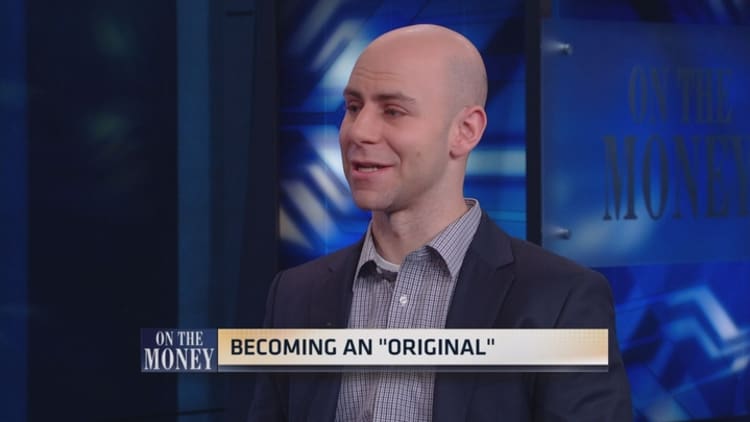
All innovation and change originates with an idea. But you probably don't want to go with your first one.
Instead, try your 25th.
That's one of the findings in "Originals: How Non-Conformists Move the World," a new book by Adam Grant. In the tome, the professor of management at the Wharton School of the University of Pennsylvania uses research and case studies of innovators to show readers what it takes to recognize an original idea — and what it takes to bring it to life.
During an interview with CNBC's "On the Money" Grant said his research shows that, contrary to popular belief, "originals" are not necessarily the crazy ones — like Bill Gates, who famously dropped out of college to start Microsoft — ready to drop everything to pursue an idea.
Read MoreThis rapper is an angel...investor, that is
"You don't have to be a round peg in a square hole to be original, Grant told CNBC. "In fact, many originals hate taking risks."
Grant added: "If you look at the data, entrepreneurs who avoid risk by saying, 'You know what, I'm going to keep my day job before I go all in' are 33 percent less likely to fail."
The author pointed to Phil Knight, who is the CEO of Nike. Knight spent years as an accountant and sold shoes out of the trunk of his car. "If he had gone all in right away, he would have felt a lot of pressure to say, 'I have to get this product to market,' " Grant said. "Instead he was able to work out this great athletic shoe and build out an extraordinary company."
It was the same cautious approach the founders of Warby Parker used when starting their business. Their mission was to disrupt the eyewear industry by bringing affordable, fashionable glasses to the masses online. Neil Blumenthal, one of the four founders, was also one of Grant's first students at Wharton. Blumenthal pitched his professor the business idea and gave him an opportunity to invest.
Grant, however, declined.
In his book, Grant wrote about how he was worried Blumenthal's aversion to risk would hurt the business. The professor actually thought Blumenthal should quit business school and go all in.
Instead, Blumenthal wanted to finish school and have a backup plan. Oddly enough, that was one of the reasons Grant stayed on the sidelines.
That may have been a shortsighted decision. Warby Parker, founded in 2010, is now valued at over a billion dollars after its latest round of funding. Grant says he wanted to understand how he could be so wrong and put his research into a book.
Teaching the kids originality
Grant looked at one study that showed how architects' upbringing differed than their technically skilled yet less creative peers.
As it turns out, parents of the architects tended to focus on values rather than rules. The children were given the freedom to figure out how to achieve those goals. In effect, it taught them how to think, not what to think.
"Once they had to go against the grain, they were much more comfortable saying, 'Look, this is who I am, this is what I believe in,' and maybe not listening so much to naysayers," Grant told CNBC.
But what did Grant find most surprising?
"There's some evidence suggesting that parental conflict helps to fuel creativity among kids," he said. "Because when your parents don't agree with each other, you have to think for yourself."
That suggests it's OK if parents are not completely in sync about what to tell the kids; it may actually be good for them in the long run.
"On the Money" airs on CNBC Saturdays at 5:30 a.m. ET, or check listings for air times in local markets.





